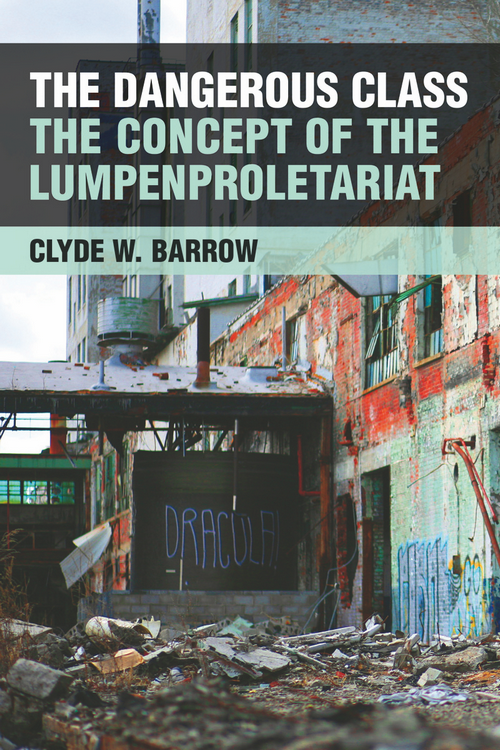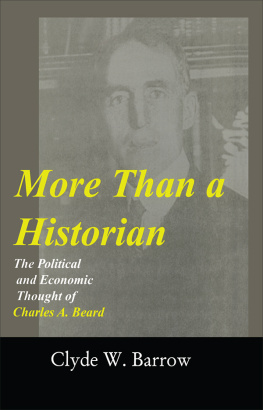Clyde W. Barrow - The Dangerous Class: The Concept of the Lumpenproletariat
Here you can read online Clyde W. Barrow - The Dangerous Class: The Concept of the Lumpenproletariat full text of the book (entire story) in english for free. Download pdf and epub, get meaning, cover and reviews about this ebook. year: 2020, publisher: University of Michigan Press, genre: Politics. Description of the work, (preface) as well as reviews are available. Best literature library LitArk.com created for fans of good reading and offers a wide selection of genres:
Romance novel
Science fiction
Adventure
Detective
Science
History
Home and family
Prose
Art
Politics
Computer
Non-fiction
Religion
Business
Children
Humor
Choose a favorite category and find really read worthwhile books. Enjoy immersion in the world of imagination, feel the emotions of the characters or learn something new for yourself, make an fascinating discovery.

- Book:The Dangerous Class: The Concept of the Lumpenproletariat
- Author:
- Publisher:University of Michigan Press
- Genre:
- Year:2020
- Rating:4 / 5
- Favourites:Add to favourites
- Your mark:
- 80
- 1
- 2
- 3
- 4
- 5
The Dangerous Class: The Concept of the Lumpenproletariat: summary, description and annotation
We offer to read an annotation, description, summary or preface (depends on what the author of the book "The Dangerous Class: The Concept of the Lumpenproletariat" wrote himself). If you haven't found the necessary information about the book — write in the comments, we will try to find it.
Clyde W. Barrow: author's other books
Who wrote The Dangerous Class: The Concept of the Lumpenproletariat? Find out the surname, the name of the author of the book and a list of all author's works by series.
The Dangerous Class: The Concept of the Lumpenproletariat — read online for free the complete book (whole text) full work
Below is the text of the book, divided by pages. System saving the place of the last page read, allows you to conveniently read the book "The Dangerous Class: The Concept of the Lumpenproletariat" online for free, without having to search again every time where you left off. Put a bookmark, and you can go to the page where you finished reading at any time.
Font size:
Interval:
Bookmark:

Clyde W. Barrow
University of Michigan Press
Ann Arbor
Copyright 2020 by Clyde Barrow
All rights reserved
For questions or permissions, please contact
Published in the United States of America by
the University of Michigan Press
Manufactured in the United States of America
First published October 2020
A CIP catalog record for this book is available from the British Library.
ISBN 978-0-472-13224-9 (hardcover : alk. paper)
ISBN 978-0-472-12808-2 (ebook)
Digital materials related to this title can be found on the Fulcrum platform via the following citable URL https://doi.org/10.3998/mpub.11595814
I gratefully acknowledge the editors of the journal Teoria Polityki, who generously allowed me to include a revised version of an earlier article as chapter 6 of this book:
Clyde W. Barrow, The Dismal Science of Post-Marxist Political Theory: Is There a Future in Postindustrial Socialism? Teoria Polityki no. 2/2018 (April 2018): 20736.
BPP Black Panther Party
CMP Capitalist Mode of Production
ICE U.S. Immigration and Customs Enforcement
IRA Industrial Reserve Army
MDRM Democratic Movement for Madagascar Restoration
MECW Marx-Engels Collected Works
OED Oxford English Dictionary
SNCC Student Nonviolent Coordinating Committee
This book is the first comprehensive analysis of the concept of the lumpenproletariat in Marxist political theory. The book excavates and analyzes the use of this term from its introduction by Karl Marx and Frederick Engels in The German Ideology (1846) and The Communist Manifesto (1848) through the central role of the relative surplus population in post-Marxist political theory. Each chapter of the book makes a unique argument, and hopefully a substantive contribution to historical and contemporary debates about the concept of the lumpenproletariat. Marx and Engels used the term sixty-four times in their collected works, not including synonyms and other appearances of the concept. However, the lumpenproletariat makes it most dramatic appearance in Marxs The Class Struggles in France (1850) and The Eighteenth Brumaire of Louis Bonaparte (1852), and as I document in subsequent chapters, Marx and Engels repeatedly returned to the concept in their analyses of the economic, cultural, and political development of capitalist societies.
Political theorists of the 2nd (Socialist) and 3rd (Communist) Internationals occasionally discussed the problem of the lumpenproletariat, but like Marx and Engels before them, they left it unresolved, except to suggest that an expansion of the lumpenproletariat in the 1930s had played a critical role in the rise of European Nazi and fascist movements just as it had been a critical base of support for the French Bonapartist regime of the 1850s and 1860s. The concept was largely dormant in Marxist political discussion until it resurfaced in the early 1960s and 1970s. This period witnessed a surge of interest in the concept of the lumpenproletariat as Third World insurgencies and the Black Power movement advanced the Page 2 idea that the lumpenproletariat was replacing the proletariat as the new vanguard of a global anticapitalist movement. Following the demise of these movements in the late 1970s, the lumpen debate was superseded in the 1980s by a post-Marxist analysis of the growing surplus population in global capitalism. These largely European theoretical discussions were superseded in the 1990s as neoconservatives in the United State grew increasingly concerned about the rise of a white underclass, that is, a white lumpenproletariat.
This book argues that the old lumpen debate has attained renewed salience with the election of U.S. president Donald Trump and the rise of right-wing populist movements throughout the world, which are often seen as a reactionary mass movement that draws considerable support from a burgeoning lumpenproletariat; this is exactly the historical political role assigned to it by Karl Marx and Frederick Engels across four decades of historical, economic, and political writings. Marx and Engels literally invented the term lumpenproletariat, using it first in their long-unpublished work, The German Ideology (1846), to distinguish the rising industrial proletariat from a different class they described in The Communist Manifesto (1848) as the dangerous class, the social scum, that passively rotting mass thrown off by the lowest layers of old society.
In these early writings, Marx and Engels juxtapose the proletariat against the lumpenproletariat to argue that the proletariat alone is a really revolutionary class. In making this distinction, Marx and Engels were initially engaged in a polemic with the anarchist Max Stirner, and later with the anarchist Michael Bakunin, who both viewed the lumpenproletariat as a revolutionary class because of its impoverished existence on the margins of capitalist society. In contrast, Marx and Engels argued that precisely because of their impoverished existence on the margins of capitalist society, the lumpenproletariats conditions of life... prepare it far more for the part of a bribed tool of reactionary intrigue, rather than the revolutionary transformation of capitalist society.
The concept of the lumpenproletariat rarely reappears in Marxs and Engelss later theoretical writings, but it does occur in several of their historical political writings, particularly in The Class Struggles in France and The 18thBrumaire of Louis Bonaparte. In these historical analyses of the French Revolution of 1848, and Louis Bonapartes subsequent machinations to become the dictator of France through a coup dtat, the course of historical events seemed to bear out Marxs and Engelss claim in The Communist Page 3 Manifesto that the lumpenproletariat would indeed serve as a bribed tool of reactionary intrigue in revolutionary and postrevolutionary conditions. In short, the lumpenproletariat betrayed the proletariat at the barricades by going over to the bourgeoisie for a few francs. The lumpenproletariat was then organized into a mass base to support Louise Bonapartes dictatorship, while it also provided the foot soldiers for extra-legal or quasi-legal militias that maintained law and order against the dictatorships critics and enemiesparticularly, radical workers and intellectuals.
However, Marxs and Engelss theoretical analysis left us with what I call the problem of the lumpenproletariat. On the one hand, Marx and Engels assigned to the lumpenproletariat a significant and even decisive role in their political analyses of historical class struggles in nineteenth-century capitalist societies, but on the other hand they assume in their more theoretical writings that in the long run, all other classes [except the bourgeoisie and proletariat] decay and finally disappear in the face of Modern Industry. Thus, despite the lumpenproletariats significant, and reactionary, historical role in nineteenth-century class struggles, Marx and Engels seem to suggest that the lumpenproletariat will eventually be relegated to the dustbin of history along with all other classes except the bourgeoisie and the proletariat, and even these classes will disappear in the course of a transition from socialism to communism.
This view of the lumpenproletariat was largely accepted by Marxist theorists of the 2nd and 3rd International, including Karl Kautsky, Rosa Luxemburg, V. I. Lenin, and Mao Tse-tung. However, in the twentieth century, these political theorists faced the exact same practical problem of the lumpenproletariat that Marx and Engels had confronted in the nineteenth century. While the lumpenproletariat might disappear in some distant socialist future, it remained a sociological and political reality that had to be confronted in the present time, because the lumpenproletariat could play a critical role in both parliamentary and revolutionary politics, just as it had done in France from 1848 to 1871. While later theorists grappled with the problem of the lumpenproletariat, none of them offered a definitive answer on how to prevent it from acting as bribed tools of reactionary intrigue. Karl Kautsky offered the harshest assessment, concluding that the lumpenproletariat would simply have to be dealt with by force of state. Rosa Luxemburg saw this option as counterproductive and instead proposed to make the lumpenproletariat into bribed tools of socialist intrigue with a rapid and massive expansion of social welfare that would quiet Page 4 them. Lenin and Mao both entertained the idea that lumpenproletarians might be recruited into revolutionary armies and controlled with military discipline, but based on their experience both of them cautioned that the lumpenproletariat was always a source of disruption and it could never be trusted within the socialist movement because of its anarchistic and criminal inclinations.
Next pageFont size:
Interval:
Bookmark:
Similar books «The Dangerous Class: The Concept of the Lumpenproletariat»
Look at similar books to The Dangerous Class: The Concept of the Lumpenproletariat. We have selected literature similar in name and meaning in the hope of providing readers with more options to find new, interesting, not yet read works.
Discussion, reviews of the book The Dangerous Class: The Concept of the Lumpenproletariat and just readers' own opinions. Leave your comments, write what you think about the work, its meaning or the main characters. Specify what exactly you liked and what you didn't like, and why you think so.











